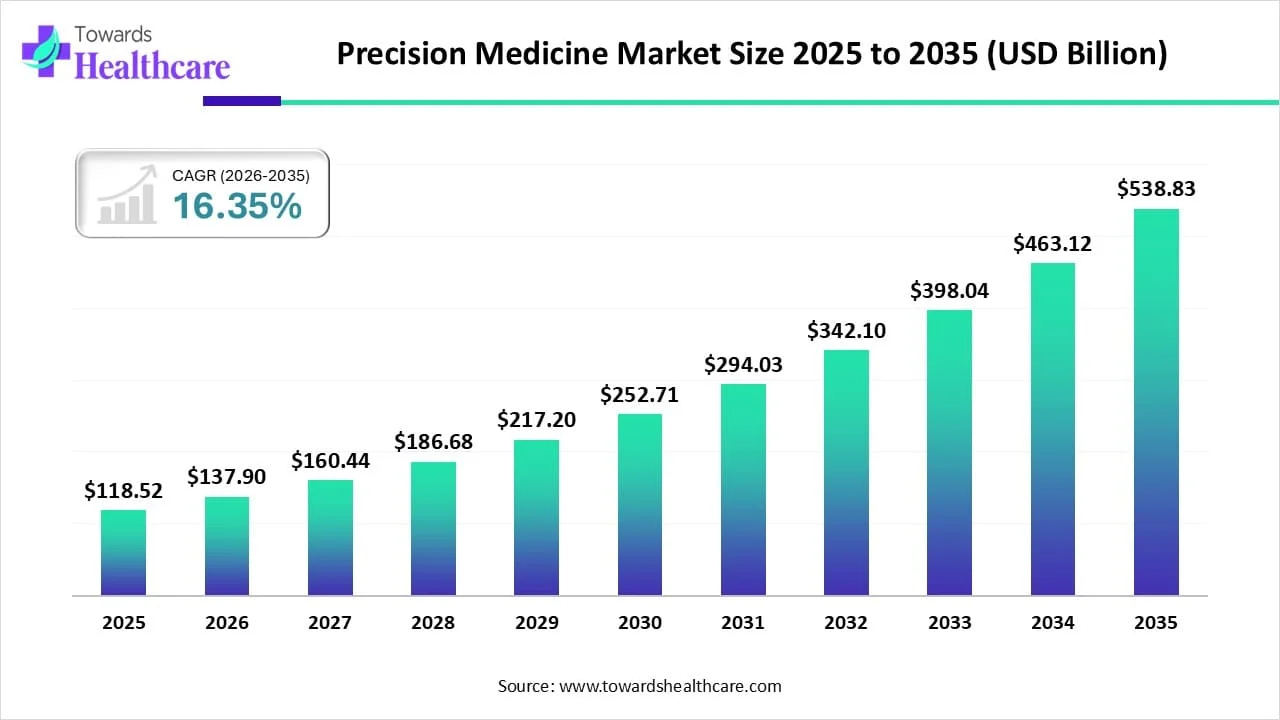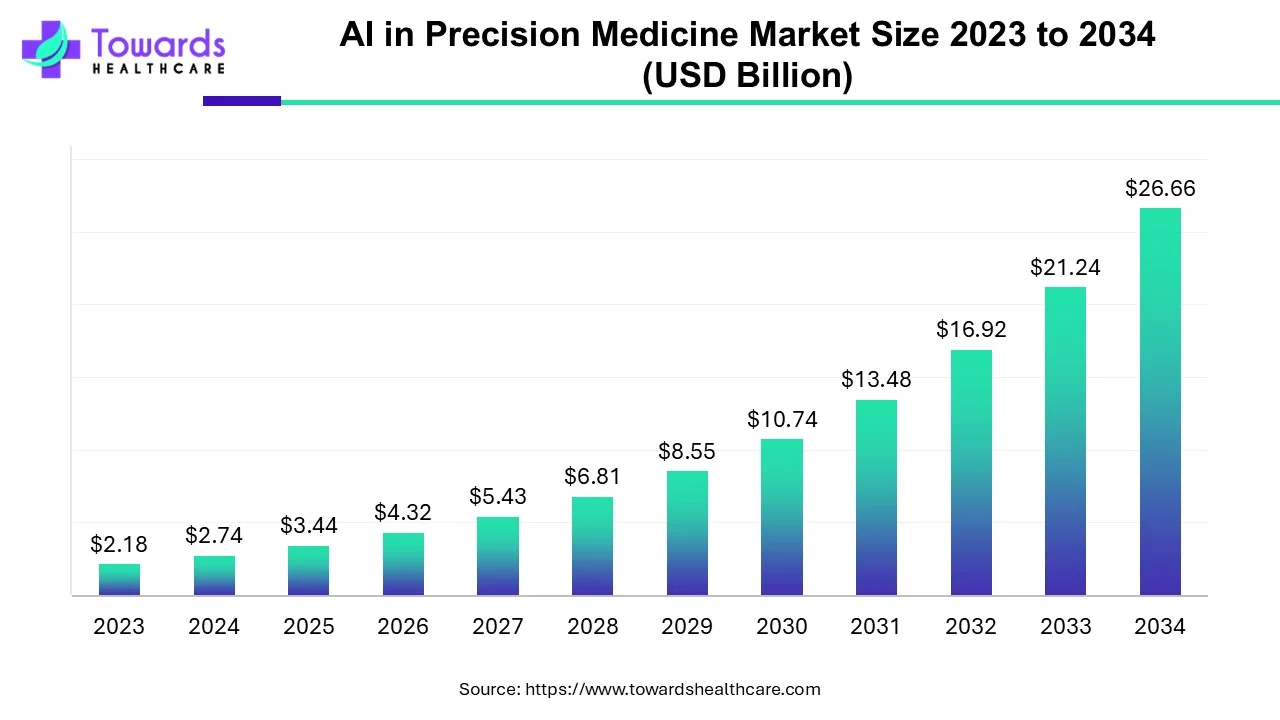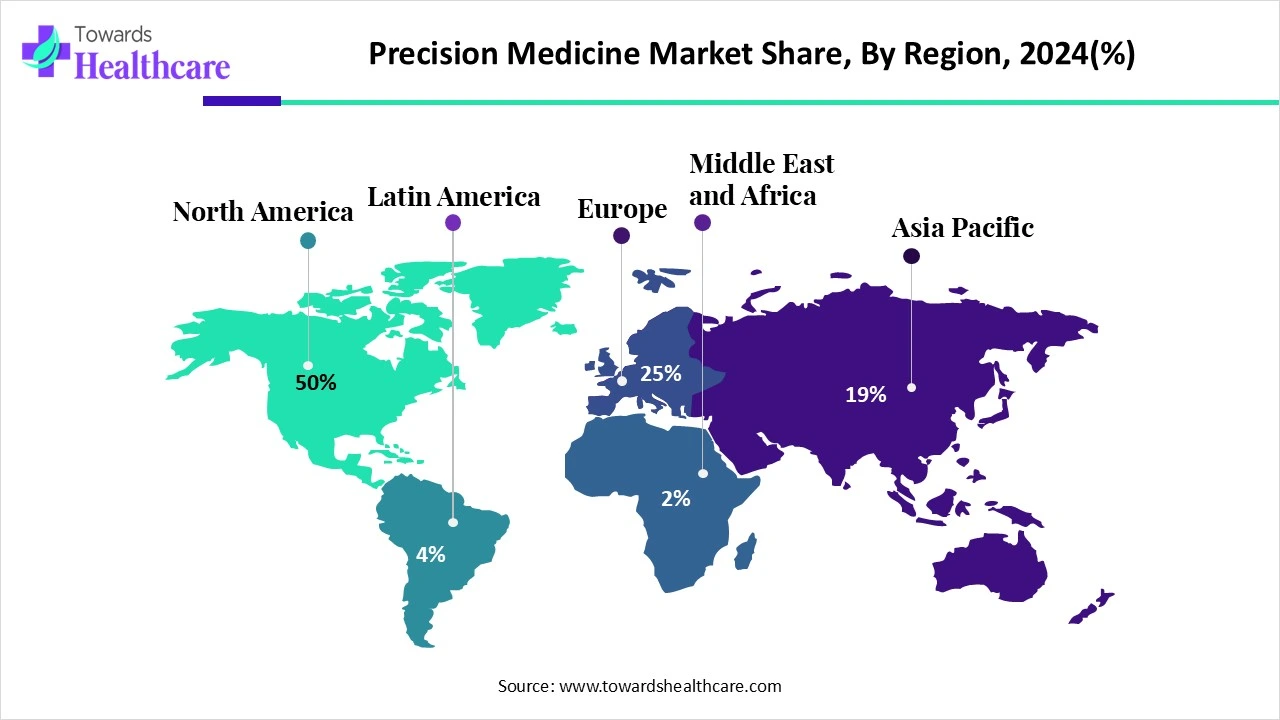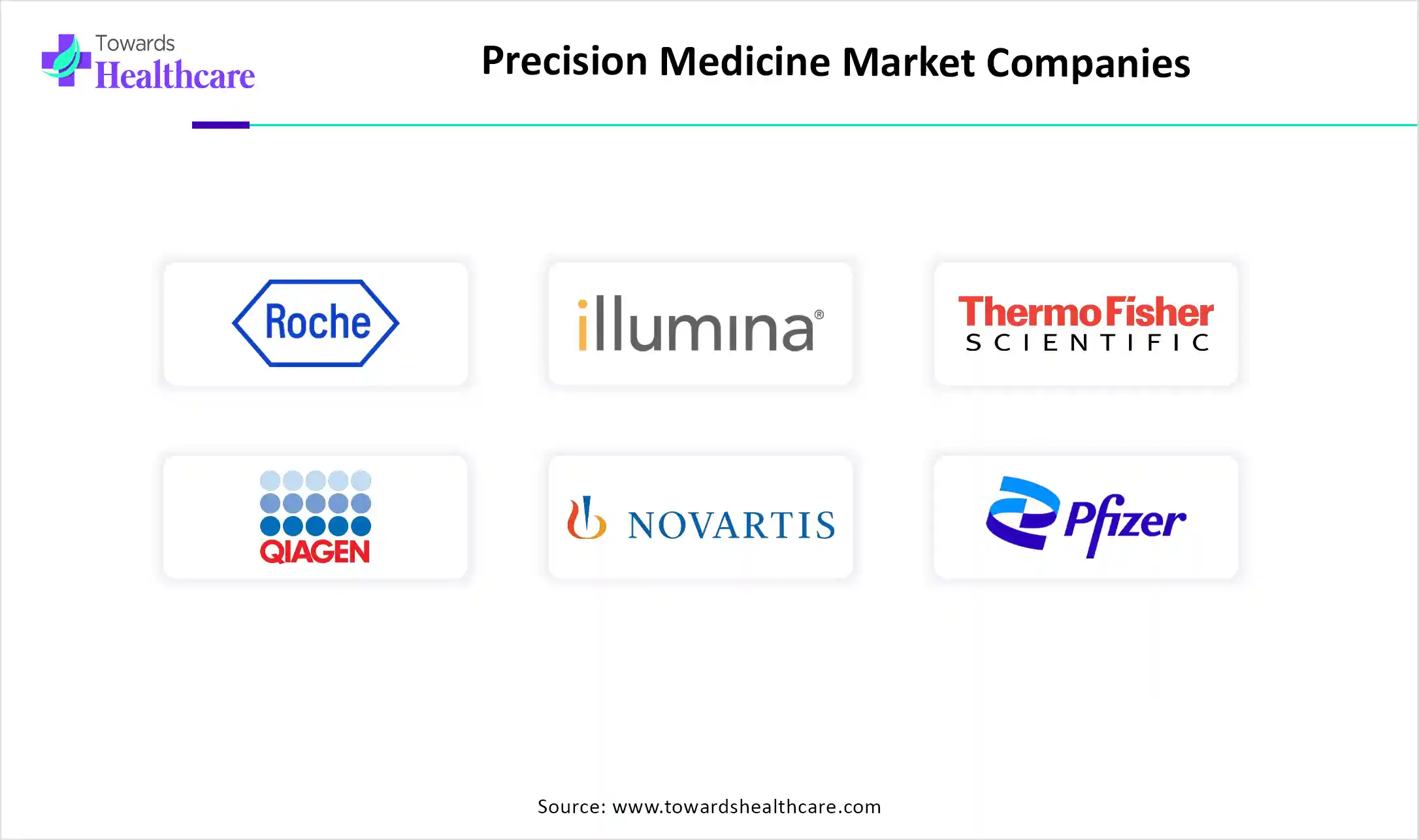February 2026

The global precision medicine market size is calculated at USD 118.52 billion in 2025, grow to USD 137.9 billion in 2026, and is projected to reach around USD 538.83 billion by 2035.The market is expanding at a CAGR of 16.35% between 2026 and 2035.

The precision medicine market is expanding rapidly, driven by advancements in genomics, AI integration, and a shift toward personalized healthcare This approach tailors treatments based on individual genetic, environmental, and lifestyle factors, enhancing therapeutic efficacy and minimizing adverse effects. With the increasing prevalence of chronic diseases and supportive regulatory frameworks, precision medicine is becoming integral to modern healthcare, offering improved patient outcomes and cost-effective solutions.
| Metric | Details |
| Market Size in 2026 | USD 137.9 Billion |
| Projected Market Size in 2035 | USD 538.83 Billion |
| CAGR (2026 - 2035) | 16.35% |
| Leading Region | North America share by 50% |
| Market Segmentation | By Product & Service, By Application, By Technology, By End User, By Region |
| Top Key Players | Roche Diagnostics, Illumina, Inc., Thermo Fisher Scientific, QIAGEN N.V., Agilent Technologies, Novartis AG, Pfizer Inc., Merck & Co., Inc., Johnson & Johnson, Bio-Rad Laboratories, Inc., Guardant Health, Adaptive Biotechnologies, Foundation Medicine (Roche), Natera, Inc., Invitae Corporation, Myriad Genetics, 23andMe, Inc., GeneDx (a subsidiary of Invitae), Guardant Health, Genomic Health, Inc. |
Precision Medicine is a medical model that tailors the prevention, diagnosis, and treatment of diseases to individual variability in genes, environment, and lifestyle. This approach aims to optimize therapeutic efficacy and minimize side effects by targeting therapies based on patient-specific biomarkers and genetic profiles. The precision medicine market is evolving through the integration of advanced technologies such as artificial intelligence and next-generation sequencing, enabling more accurate and personalized treatments. Collaborations between pharmaceutical companies and tech firms are enhancing data analytics capabilities, facilitating the development of targeted therapies. Additionally, supportive government initiatives and increased funding for research are accelerating the adoption of precision medicine, particularly in oncology and rare diseases, leading to improved patient outcomes and a shift towards more individualized healthcare solutions.
For Instance,
AI is significantly transforming the market by enabling faster and more accurate analysis of complex genetic, clinical, and lifestyle data. It helps identify disease patterns, predict patient responses to treatments, and accelerate drug discovery. AI-driven tools enhance diagnostic accuracy, personalize therapy selection, and support real-time clinical decision-making. By streamlining workflows and improving predictive capabilities, AI is making precision medicine more efficient, scalable, and accessible, ultimately leading to better patient outcomes and cost-effective healthcare solutions.
The global Artificial Intelligence (AI) in precision medicine market size is projected to rise from USD 2.74 billion in 2024 to over USD 26.66 billion by 2034, expanding at a CAGR of 25.54% during the forecast period. This growth is driven by the increasing prevalence of cancer and the growing demand for personalized healthcare solutions.

Rising Prevalence of Chronic Diseases
The rising prevalence of chronic diseases such as cancer, diabetes, and cardiovascular disorders is a major driver in the precision medicine market. These conditions often require long-term, tailored treatment strategies, which precision medicine can provide by targeting therapies based on individual genetic and molecular profiles, as traditional treatments may not be effective for all patients, precision outcomes, reducing trials-and-error in treatment, and increasing the demand for innovative, patient-specific healthcare solutions.
Ethical Challenges
Ethical challenges limit the growth of the precision medicine market by raising questions around fairness, accessibility, and equitable treatment. High-cost personalized therapies may not be affordable or available to all, potentially widening health disparities. Additionally, concerns about bias in algorithms and unequal representation in genetic databases can lead to ineffective or unsafe treatments for certain populations, prompting hesitation among stakeholders and slowing the broader adoption of precision medicine across diverse communities.
Expanding Application of Precision Healthcare
The growing integration of personalized healthcare approaches into diverse medical fields creates strong potential for market expansion. As precision medicine moves beyond cancer care into areas like autoimmune, metabolic, and infectious diseases, it opens doors for more targeted therapies. This evolution is driven by improvements in diagnostics, biomarker discovery, and patient-specific data use, enabling more effective and individualized treatment strategies, ultimately boosting the adoption and development of precision medicine solutions across the healthcare sector.
The therapeutics (targeted therapy) segment led the precision medicine market due to its ability to deliver treatment tailored to individual genetic profiles, improving efficacy and minimizing side effects. These therapies are widely adopted, especially in oncology, where they target specific molecular pathways involved in cancer progression. Advancements in genomic research and companion diagnostics have further accelerated their use, making targeted therapies a preferred option over traditional treatment and contributing significantly to the market leadership.
The fastest growth of the data analytics & software segment in precision medicine is driven by the rising adoption of digital health technologies and the need for advanced tools to process large-scale, multi-omics datasets. These platforms enhance clinical decision-making by uncovering meaningful insights from complex biological data. With the push towards personalized care, healthcare providers increasingly rely on intelligent software to support diagnostics, treatment planning, and predictive modelling, fueling strong demand in the market.
The oncology segment dominated the market in 2024, largely due to its early integration of genetic and molecular profiling into clinical practice. Personalized cancer treatment has shown improved patient outcomes, leading to its growing acceptance. Continuous innovation in targeted therapies, rising cancer incidence, and increasing use of companion diagnostics have further fueled segment growth. Moreover, strong investment in cancer research and clinical trials has reinforced oncology’s leading position in the precision medicine landscape.
The rare genetic diseases segment is projected to witness the fastest growth in the precision medicine market as innovative diagnostic tools and personalized therapies are increasingly addressing previously untreatable conditions. With limited treatment options available through traditional methods, precision medicine offers targeted solutions tailored to specific genetic mutations. Growing focus from biotech companies, rising patient advocacy, and supportive incentives for orphan drug development are further accelerating progress and expanding the potential of this market throughout the forecast period.
In 2024, the genomics segment held the largest share of the precision medicine market due to its critical role in identifying genetic variation that drives disease. Genomics technologies enable more accurate diagnosis and personalized treatment plans by decoding individual DNA sequences. The widespread adoption of next-generation sequencing, declining costs of genome analysis, and its extensive application in oncology, rare diseases, and pharmacogenomics have significantly boosted the segment's dominance in precision healthcare solutions.
The pharmacogenomics segment is projected to grow rapidly as it enables more precise drug selection and dosing based on a patient’s genetic makeup, reducing adverse drug reactions and improving treatment outcomes. With growing interest in personalized care, healthcare providers are increasingly incorporating pharmacogenomics insights into clinical decision-making. Continued innovation in genetic testing technologies, combined with a rising focus on optimizing therapeutic efficacy, is accelerating the adoption of pharmacogenomics across multiple therapeutic areas during the study period.
The hospitals & clinics segment held the leading share in the precision medicine market in 2024, driven by their widespread access to advanced medical equipment and trained professionals capable of delivering personalized care. These facilities are increasingly adopting precision-based approaches for diagnosing and managing complex conditions like cancer and genetic disorders. Their ability to provide integrated services-from genetic testing to targeted therapies, makes them a key player in the implementation and expansion of precision medicine practices.
The pharmaceutical & biotech companies segment is projected to expand rapidly as these organizations focus on developing innovative, patient-specific therapies. With growing access to genetic insights and advanced molecular tools, they are shifting away from one-size-fits-all treatments towards more customized solutions. Increased funding, technological advancements, and a surge in partnerships for precision drug discovery are also fueling momentum, positioning this market for the fastest year-over-year growth during the study period.

North America's leadership in the precision medicine market shares by 50% in 2024 stems from its strong focus on biomedical innovation, widespread use of advanced diagnostic tools, and increasing public-private collaborations. Supportive policies, a well-established regulatory environment, and access to cutting-edge technologies have further boosted market adoption. Additionally, the rising burden of chronic and genetic diseases has heightened the need for personalized treatment options, making the region a major hub for research, clinical trials, and the commercialization of precision healthcare solutions.
The U.S. market is expanding rapidly due to its strong biotech ecosystem, rising adoption of personalized treatment approaches, and integration of cutting-edge technologies like AI and next-generation sequencing. Increased funding for research, a high burden of chronic and rare diseases, and proactive regulatory support are also key drivers. Additionally, strategic partnerships between academic institutions, healthcare providers, and industry players are accelerating innovation and translating scientific advances into patient-centered solutions.
For Instance,
Canada's market is witnessing strong growth due to its increasing focus on personalized healthcare, supported by advancements in genomics and digital health infrastructure. The rise in chronic illnesses and rare genetic conditions is prompting greater demand for tailored therapies. Additionally, national investments in biomedical research, data-driven health initiatives, and supportive healthcare policies are accelerating innovation. Strong collaboration between academic institutions, biotech firms, and healthcare systems is also playing a key role in driving market expansion.
The Asia-Pacific market is projected to grow at the fastest CAGR during the forecast period, driven by several significant investments in genomics, AI-driven diagnostics, and digital health technologies that are transforming healthcare delivery in the region. Countries like China, Japan, and India are enhancing their healthcare infrastructure and fostering public-private partnerships to support personalized medicine initiatives. The rising prevalence of chronic diseases, coupled with increased awareness and supportive government policies, is accelerating the adoption of precision medicine across diverse healthcare settings.
China's market is expanding rapidly due to government initiatives like the Healthy China 2030 plan, which has prioritized personalized healthcare, fostering substantial investments in genomics and biotechnology. Advancements in gene sequencing technologies and artificial intelligence are enhancing diagnostic accuracy and treatment personalization. The rising prevalence of chronic diseases, particularly cancer, is increasing demand for targeted therapies. Additionally, collaborations between domestic and international pharmaceutical companies are accelerating research and development, further propelling market growth.
India's market is expanding rapidly due to the increasing prevalence of chronic diseases like cancer and diabetes is driving demand for personalized treatments. Advancements in genomics, artificial intelligence, and data analytics are enhancing diagnostic accuracy and treatment efficacy. Government initiatives, such as the establishment of genomic research centers, are fostering innovation. Additionally, collaborations between pharmaceutical companies and research institutions are accelerating the development and adoption of precision medicine across the country.
Europe is accelerating its market through a combination of strategic investments, technological advancements, and supportive policies. The European Union's Horizon Europe program and initiatives like the 1+ Million Genomes Project are fostering cross-border collaboration in genomics and personalized healthcare. Countries such as the UK, Germany, and France are enhancing their healthcare infrastructures, integrating AI and big data analytics to improve diagnostics and treatment personalization. Additionally, public-private partnerships and investments in digital health are driving innovation, making Europe a significant player in the global precision medicine landscape.
The UK market is expanding due to government initiatives, such as the 100,000 Genomes Project, which have laid the groundwork for integrating genomics into routine healthcare. Significant investments from companies like BioNTech and Moderna are bolstering research in personalized therapies. Additionally, regulatory reforms aim to expedite drug approvals, enhancing patient access to tailored treatments. The UK's robust R&D infrastructure and emphasis on digital health technologies further drive the growth of precision medicine.
Germany's market is expanding due to its robust healthcare infrastructure, significant investments in genomics and AI-driven diagnostics, and strong public-private partnerships. The government's support for digital health initiatives and the integration of advanced technologies have enhanced personalized treatment approaches. Additionally, the presence of leading pharmaceutical and biotech companies, along with a skilled workforce, further propels the market's growth. These factors collectively position Germany as a key player in the global precision medicine landscape.
Latin America is expected to grow at a notable CAGR in the foreseeable future. The rising prevalence of chronic disorders and increasing R&D investments facilitate the development of personalized medicines. Government bodies and regulatory agencies are making constant efforts to establish a favorable research, clinical trial, and manufacturing infrastructure. The increasing collaborations and public-private partnerships also contribute to market growth.
According to a recent report, over 13 million people are affected by rare genetic diseases. SPOAN syndrome is a rare disease that affects 68 people in Brazil, of whom 47 are from Seridó. Thus, the Brazilian government has launched the “Brazilian Initiative on Precision Medicine (BIPMed)” to facilitate the implementation of precision medicine.
The Middle East & Africa are expected to grow at a considerable CAGR in the upcoming period. Government organizations provide funding and launch initiatives to support the development of precision medicines. They also encourage the general public to screen for and early diagnose their chronic disorders, enabling healthcare professionals to provide early intervention. The rapidly expanding genomic and proteomics sector fosters market growth.
The UAE government’s Precision Medicine Policy aims to establish a roadmap for standardizing health data, develop a robust regulatory framework, and emphasize the implementation of precision medicine. The National Genome Strategy also aims to establish a legal framework to regulate the use of genomics in healthcare and personalized medicine.

The National Institutes of Health (NIH), through its National Cancer Institute (NCI), has initiated a precision medicine clinical trial called myeloMATCH to evaluate new drug combinations that target genetic mutations in patients with acute myeloid leukemia (AML) and myelodysplastic syndromes (MDS). These fast-moving and genetically diverse blood cancers require precise treatment strategies. The trial seeks to quickly identify cancer subtypes and begin targeted therapies soon after diagnosis. Dr. Richard F. Little of NCI emphasized that the goal is to match patients with the most effective drug combinations as early as possible to improve outcomes. (Source - News medical life science)
By Product & Service
By Application
By Technology
By End User
By Region
February 2026
February 2026
February 2026
February 2026